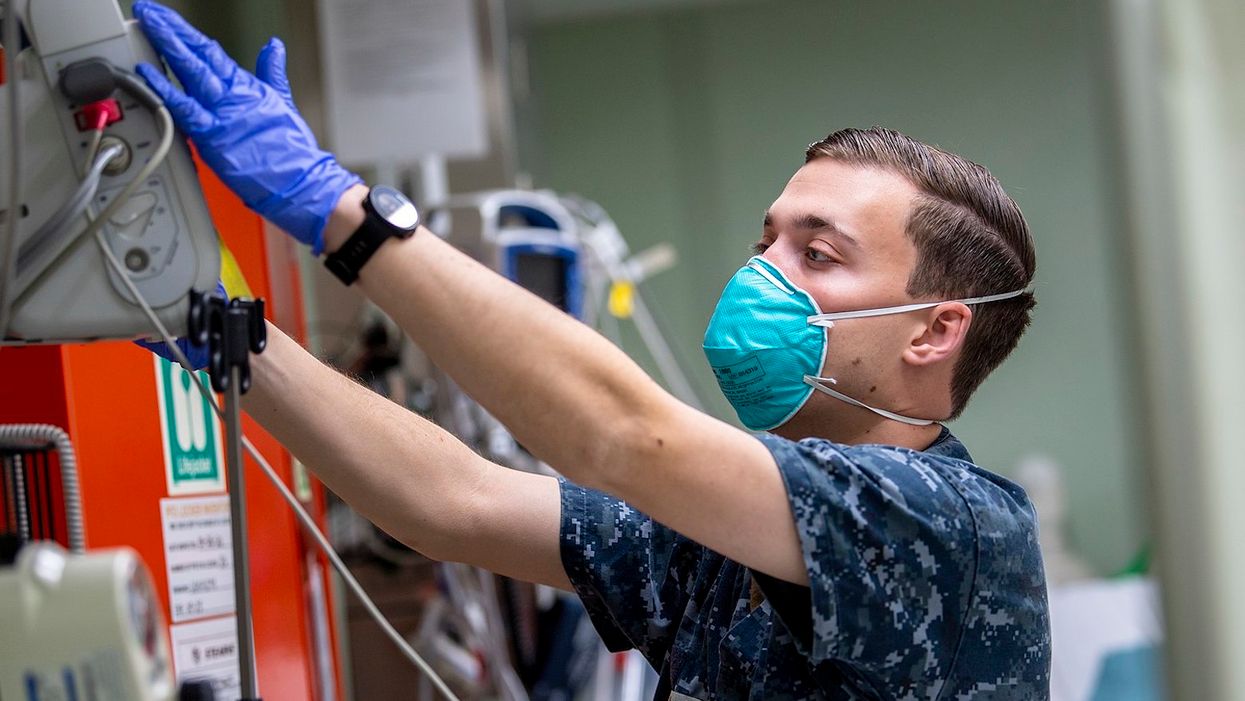A new data analysis out Tuesday demonstrates that Covid-19 is now killing people at a significantly higher rate in the United States than in other rich countries, a grim reality that analysts have attributed to the nation's lagging vaccination campaign and—more broadly—its fragmented for-profit healthcare system.
Citing figures from Johns Hopkins University, the World Bank, and the U.S. government, the New York Times reports that the country's deaths during the ongoing Omicron wave "have now surpassed the worst days of the autumn surge of the Delta variant, and are more than two-thirds as high as the record tolls of last winter, when vaccines were largely unavailable."
"Despite having one of the world's most powerful arsenals of vaccines, the country has failed to vaccinate as many people as other large, wealthy nations. Crucially, vaccination rates in older people also lag behind certain European nations," the Times noted. "The United States has fallen even further behind in administering booster shots, leaving large numbers of vulnerable people with fading protection as Omicron sweeps across the country."
In addition to highlighting the role of rampant right-wing disinformation in vaccine hesitancy among many Americans, experts and commentators have pointed to structural barriers such as poverty, lack of paid sick leave, and massive levels of uninsurance as key factors hindering the U.S. pandemic response and driving up the coronavirus death toll. Research by the Kaiser Family Foundation has shown that unvaccinated Americans are more likely to be uninsured than vaccinated adults.
"Many more Americans would be vaccinated if our healthcare system wasn't so terrifying," healthcare journalist Natalie Shure argued in a column for The New Republic last year. "Though Congress passed legislation mandating that Covid-19 vaccines be free at the point of use for all U.S. residents, around one-third of unvaccinated people cited fear of cost as a significant reason they've yet to get the jab."
"As it happens," Shure noted, "patients across the country have been slapped with coronavirus-related medical bills throughout the pandemic, sometimes getting hit with steep charges for testing and treatment in spite of Congress' mandates... Even if such events are rare, the startlingly widespread concern about it poses an undeniable threat to public health—and is just the latest illustration of the havoc wrought by a healthcare system that millions of people are too terrified to use."
According to a study released in December by West Health and Gallup, 30% of U.S. adults reported skipping treatment for a health problem in the prior three months and nearly 60% said the pandemic heightened their concerns about healthcare costs.
"One in every 20 U.S. adults—an estimated 12.7 million people—report knowing a friend or family member who died this past year after not receiving treatment because they could not afford it," the study found.
While the Times analysis doesn't emphasize the potentially massive impact the for-profit U.S. healthcare system has had on the country's vaccination effort and coronavirus death rate, the newspaper does point to economic factors, highlighting survey data which indicates that "the poorest Americans are the likeliest to remain unvaccinated, putting them at greater risk of dying from Covid."

"You know what every country on this graph except for the USA has?" asked political anthropologist and physician Eric Reinhart in response to the Times analysis. "Universal healthcare guaranteed to every resident."
"Almost seems like that might matter for public health and the trust in medicine, science, and government upon which public health depends," Reinhart added.
Daniel Farber, a professor at the University of California, Berkeley School of Law, added that the Times' data compilation spotlights "the dark side of American exceptionalism."
On average, the coronavirus is killing an estimated 2,600 people every day in the U.S., a staggering figure that experts fear is becoming "normalized" among the country's political establishment and population.
"If we want to declare the end of the pandemic right now, what we're doing is normalizing a very high rate of death," Anne Sosin, a health equity researcher at Dartmouth College, told the Times.
Progressives have argued throughout the pandemic that the privatized U.S. healthcare system—with its sky-high costs and countless barriers to treatment—left the country dangerously unprepared to combat the threat of Covid-19.
The consumer advocacy group Public Citizen estimated in a report last March that hundreds of thousands of coronavirus deaths likely would have been prevented if the U.S. had a single-payer, Medicare for All system.
"Under Medicare for All, everyone would have consistent coverage regardless of their employment status or employer," the report argued. "And because Americans would have their choice of providers, instead of facing the narrow networks their employers choose for them, they would face fewer challenges getting care, especially during a pandemic where some hospitals and providers are overwhelmed by demand."



